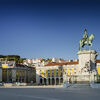13 Nights | 16NT Spain Canary Iceland N Lights EXP
About Gran Canaria, Spain
You will visit the following 4 places:

Tenerife
Tenerife is the largest and most populated island of the seven Canary Islands; it is also the most populated island of Spain. Tenerife is also the largest and most populous island of Macaronesia. About five million tourists visit Tenerife each year, the most of any of the Canary Islands. It is also one of the most important tourist destinations in Spain and the world. Tenerife hosts one of the world's largest carnivals and the Carnival of Santa Cruz de Tenerife is attempting to become a World Heritage Site. The island is home to the University of La Laguna, which was founded in 1792 and is the oldest university in the Canaries. San Cristóbal de La Laguna (a World Heritage Site) is the second city of the island and the third one of the archipelago. The city of La Laguna was also capital of the Canary Islands until Santa Cruz replaced it in 1833. In the Teide National Park (World Heritage Site), in the center of the island, is the highest elevation of Spain as well as the highest of the islands of the Atlantic Ocean, and the third largest volcano in the world from its base, Teide. Also located on the island Macizo de Anaga since 2015 is Biosphere Reserve and is the place that has the largest number of endemic species in Europe. The island's capital contains the architectural symbol of the Canary Islands, the modern Auditorio de Tenerife.

Lisbon
The capital of Portugal, Lisbon (Portuguese: Lisboa) has experienced a renaissance in recent years, with a contemporary culture that is alive and thriving and making its mark in today's Europe. Perched on the edge of the Atlantic Ocean, Lisbon is one of the rare Western European cities that faces the ocean and uses water as an element that defines the city. Lisbon enchants travellers with its white-bleached limestone buildings, intimate alleyways, and an easy-going charm that makes it a popular year-round destination.

Madeira
Madeira is a Portuguese archipelago situated in the north Atlantic Ocean, southwest of Portugal. The capital of Madeira is Funchal on the main island's south coast. Since 1976, the archipelago has been one of the two Autonomous regions of Portugal (the other being the Azores, located to the northwest). It includes the islands of Madeira, Porto Santo, and the Desertas, administered together with the separate archipelago of the Savage Islands. It is an outermost region of the European Union. Today, it is a popular year-round resort, being visited every year by about one million tourists. The region is noted for its Madeira wine, gastronomy, historical and cultural value, its flora and fauna, landscapes (Laurel forest) which are classified as a UNESCO World Heritage Site and embroidery artisans. Its annual New Year celebrations feature the largest fireworks show in the world, as officially recognised by Guinness World Records in 2006. The main harbour in Funchal is the leading Portuguese port in cruise liner dockings, being an important stopover for commercial and trans-Atlantic passenger cruises between Europe, the Caribbean and North Africa. Madeira is the second richest region of Portugal by GDP per capita, being only surpassed by Lisbon.

Gran Canaria
Gran Canaria is the second most populous island of the Canary Islands, a Spanish archipelago. Located in the Atlantic Ocean,it was populated by the Canarii, who may have arrived as early as 500 BC. The Canarii called the island Tamarán or Land of the Brave. The third largest island in the Canary Islands, Gran Canaria has the largest population. It's often described as a "continent in miniature" because it has so much variety to offer. In the north, capital city Las Palmas is a major stop for cruise ships and duty-free shopping. The island’s interior is rural and mountainous.










